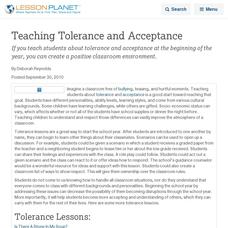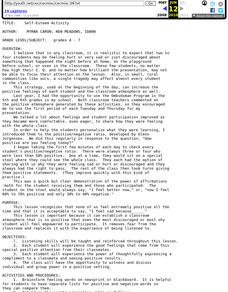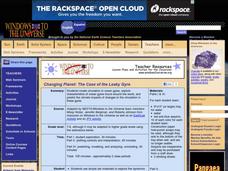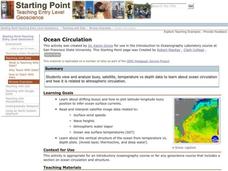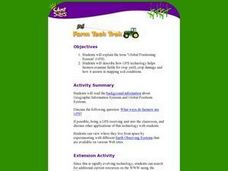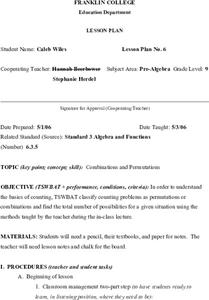Curated OER
Temperature and the Earth's Atmosphere
Earth science super stars visit the National Earth Science Teachers Association's interactive website to glean information on the layers of the atmosphere. Data tables are provided for them to record what is collected. This assignment...
Curated OER
Relative Positions of the Earth, Moon, and Sun Over Time
Teacher pages for four different activities and three assessments are provided in this resource. Topics deal with how the sun's position and Earth's atmosphere affect the amount of solar energy reaching Earth's surface. The concepts and...
Curated OER
How to Recognize the Positive: Classroom Management Lesson Plans
A better classroom environment is created when teachers start focusing on the positive, and not the negative, behavior.
Howard Hughes Medical Institute
EarthViewer
Can you imagine Washington DC and London as close neighbors occupying the same continent? Learners will be fascinated as they step back in time and discover the evolution of the earth's continents and oceans from 4.5 billion...
Curated OER
The Weather Classroom: Atmosphere
Young scholars explore the planets and their atmospheres online. They write the story of "Goldilocks and the Nine Planets" to explain how each planet's atmosphere differs from Earth's. They design a viable life form.
Curated OER
Teaching Tolerance and Acceptance
If you teach students about tolerance and acceptance at the beginning of the year, you can create a positive classroom environment.
Curated OER
Self-Esteem Activity
Students create a classroom atmosphere that is so positive that even the most discouraged or most shy student feels empowered to participate. They discuss positive and negative words and internal and external locus of control.
Curated OER
Adding & Subtracting (Combining) Integers
Maintain a positive atmosphere in your math class with this fun lesson on adding and subtracting integers. After first explaining the rules for combining positive and negative numbers, this resource uses a comic strip...
Curated OER
Self-esteem Activity
Young scholars create lists of positive and negative feelings and have discussions on the power of positive thinking. In this feelings lesson plan, students dissect situations where others are being negative.
Curated OER
Structure of the Earth
Sixth graders define atmosphere and hydrosphere, explore through experimentation how the atmosphere was formed, and describe the layers of the Earth's atmosphere and their distances.
Curated OER
Meteorology
Fourth graders study how atmospheric conditions change while naming the things that make the weather change. They investigate the affects of air masses, weather fronts and high/low pressure by looking at weather maps from newspapers.
Curated OER
The Modern Atmospheric CO2 Record
Students compare carbon dioxide (CO2) data from the Mauna Loa Observatory , Barrow (Alaska) , and the South Pole over the past 40 years to help them better understand what controls atmospheric (CO2).
International Technology Education Association
Dampen That Drift!
The spacecraft is drifting too far off course! Two games help explain how a spacecraft can use its thrusters to maintain its position. The games have pupils be the components of vectors in order to create and counteract the...
Wild BC
Carbon Sinks and Sources
Earth or environmental science pupils are assigned to be carbon sources or sinks. They ask yes-or-no questions to try to figure out which one they are. Then they discuss ways people can have positive effects on the changing climate by...
Curated OER
Changing Planet: The Case of the Leaky Gyre
The fascinating video "Changing Planet: Fresh Water in the Arctic," introduces your oceanographers to the world's gyres. They learn that melting sea ice is making the gyres larger, and that the changes could, in turn, contribute even...
Curated OER
Plants Releasing Water
Third graders investigate how water is released from different plants into the atmosphere. They observe and investigate two types of plants with domed lids with condensation and communicate those observances and inquiries on an in-class...
Curated OER
Mass Balance Model
Students explore the concept of mass balance, flow rates, and equilibrium using a simple water bucket model. For this JAVA based online interactive modeling activity, they vary flow rate into the bucket, initial water level in the...
Curated OER
Using Mass Balance to Understand Atmospheric CFCs
Students use an interactive online mass balance model to observe levels of chlorofluorocarbons over the past few years. Students evaluate the influence protocol emissions will have on the future levels of CFCs.
National Wildlife Federation
Wherefore Art Thou, Albedo?
In the sixth instructional activity in a series of 21, scholars use NASA data to graph and interpret albedo seasonally and over the course of multiple years. This allows learners to compare albedo trends to changes in sea ice with...
Curated OER
Ocean Circulation
Students view and analyze buoy, satellite, temperature vs depth data to study about ocean circulation and how is related to atmospheric circulation. They read and interpret satellite image data related to: Surface wind speeds, Wave...
Curated OER
Human Cloning: Is it Biological Plagiarism?
Is cloning good or harmful? Help your class understand the risks and benefits as they read, research, and discuss human cloning. Individuals form teams, research information, and present to the class before concluding with an in-depth...
Curated OER
End of the Year Lesson Plans and Activities
End of the year lesson plans can help you and your students finish the year right.
Curated OER
Combinations And Permutations
Seventh graders investigate the mathematical concept using a lecture format. The lesson includes a classroom management section with suggestions for lesson execution. Students write a definition for the Fundamental Counting Principle....







